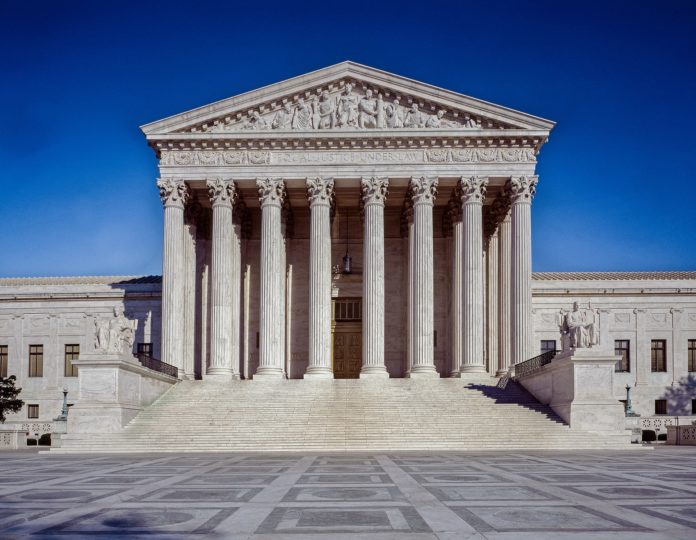

A unique identity theft case will come before the U.S. Supreme Court for oral argument Feb. 27.
Under the federal aggravated identity theft statute, it’s a crime during and in relation to a predicate felony to knowingly transfer, possess or use without legal authority, the identity of another person.
According to the petition for writ of certiorari, petitioner David Dubin was convicted of healthcare fraud. Dubin worked at his father’s psychological services company PARTS, which provided mental health testing to youth in Texas.
As relevant in this case, the petition noted, Dubin submitted a claim to Medicaid for $540 for services provided to Patient L. The petition said the government didn’t dispute whether Dubin treated the patient or had the authority to use Patient L’s name in billing. The government also didn’t contend the bill was false because of anything Dubin said about Patient L’s identity.
The government’s theory, according to the petition, was Dubin overbilled Medicaid for services provided and he was convicted of healthcare fraud. The government also indicted Dubin for aggravated identity theft. The petition added the government believed Dubin violated that federal statute because he put Patient L’s identifying information on the fraudulent Medicaid claim form.
Dubin was also found guilty of aggravated identity theft. He was sentenced to one year in prison for healthcare fraud and two years for aggravated identity theft which would run consecutively as dictated by the federal statute.
The 5th Circuit Court of Appeals affirmed. It cited the aggravated identity theft federal statute as it asks a two-part question determining criminal conduct: did the defendant use a means of identification and was that use without lawful authority or beyond the scope of the authority given? According to the petition, the 5th Circuit held that because Dubin identified Patient L in the bill he submitted and used the patient’s means of identification unlawfully, the two-part test was satisfied.
According to the petition, the 5th Circuit held “a defendant is guilty of aggravated identity theft anytime he recites someone else’s name as part of a predicate crime — even when he has authority to use that person’s name and the predicate crime does not involve a misrepresentation about that person’s identity.”
The petition argued there’s a split among the courts on how the federal aggravated identity theft is interpreted, adding the 5th Circuit’s opinion is in conflict with the majority of published opinions where the aggravated identity theft would have been vacated.
The petition noted the reach of the statute is important. It subjects an offender to a mandatory two-year prison sentence that needs to be stacked on top of the predicate offense sentence.
“Under the Fifth Circuit’s rule, moreover, the additional two-year sentence applies not only to most every commission of healthcare fraud, but would also sweep in tax preparers, immigration attorneys, and anyone else convicted of submitting any form on someone’s behalf that contains a misrepresentation unrelated to the person’s identity,” the petition argued.
The question being presented before the U.S. Supreme Court is whether a person commits aggravated identity theft any time they mention or recite someone else’s name while committing a predicate offense.
Law Week reached out to multiple attorneys in the criminal defense arena in Colorado to get their reactions to the upcoming oral argument.
Colleen Kelley, a partner at Wolf Law who specializes in criminal defense and has worked on identity theft cases at the state level, said it seemed like prosecutors in the case were trying to pile on.
“It’s a little bit like a … square peg, round hole situation,” Kelley said. She added it felt like prosecutors were trying to make things fit rather than going with what did.
Kelley noted Colorado has structured its identity theft statute differently as it’s a separate one with enumerated penalties, compared to the federal structure of a predicate crime that’s aggravated by the use of someone’s identity. Kelley said in Colorado the aggravator is built into the statute.
Kelley said she doesn’t believe the case directly affects the Colorado identity theft statute as it’s written, but it could motivate lawmakers to modify the language of it to have a broader application. Under the current statutory language in Colorado, it requires a connection between using personal or financial identifying information to get something of value without permission.
But what should the U.S. Supreme Court do when they hear this case?
“I think it’s just common sense that they should separate the two things,” Kelley said. “If it’s just an incidental usage of someone’s name, then that’s not what this was intended for.”
Kimberly Diego, of the Law Office of Kimberly Diego Criminal Defense, said although this is a federal case it could still affect her practice depending on the decision from the high court — Diego practices in state and municipal courts in Colorado.
“In other words, if the holding is limited to the question of the meaning of this particular statute, then no, it will not have an impact,” Diego wrote, whose practice area includes identity theft. “However, there could be ways the Supreme Court could decide this case where what is held may be more generally applicable to cases that are not just federal prosecutions of this statute.”
Diego believes the conviction on the count of aggravated identity theft should be reversed as the majority of the circuits agree on that.
“I do think a ruling against the petitioner sends a terrible message and condones a prosecutorial approach that seems concerned more with securing as much time as possible than with securing a just and proportionate outcome,” Diego wrote.

